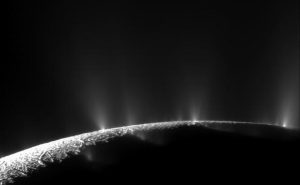
Yet another key ingredient in the recipe for biological life has been found on Saturn’s icy moon, Enceladus, a chemical compound that, in addition to being a potential energy source for primitive organisms, could also act as a basis for the formation of organic molecules that are essential for the formation of life as we know it.
Amongst a number of other organic molecules recently identified in the cryovolcanic plumes erupting from Enceladus’ south polar region, hydrogen cyanide (HCN), a compound that can act as a precursor to the formation of both amino acids and nucleic acids—proteins, and the molecular backbone of DNA and RNA, respectively—was discovered in data collected earlier by the Cassini space probe when it dipped into the icy moon’s atmosphere to collect chemical samples.
“The discovery of hydrogen cyanide was particularly exciting, because it’s the starting point for most theories on the origin of life,” explained lead study author Jonah Peter, a Harvard University doctoral student who found evidence of the presence of HCN while working at NASA’s Jet Propulsion Laboratory.
Although it is covered in an icy crust 30 to 40 kilometers thick, Enceladus is home to a globe-spanning ocean nearly ten times deeper than the average depth of the oceans found here on Earth, kept in a liquid state by a combination of radionuclides decaying in the tiny moon’s rocky core, and energy gained from tidal forces generated by Saturn’s gravitational influence.
Along with this liquid-water ocean as a mixing bowl, other ingredients crucial to the formation of life such as ammonia, carbon, methane, nitrogen and oxygen have been sampled in Enceladus’ faint atmosphere, launched high above the surface by powerful geysers. The addition of HCN to the mix, a compound considered to be a Swiss Army knife-type of molecule due to the numerous ways its atoms can be arranged, also adds to the potential that organic compounds and genetic material could be formed beneath the surface of the remote icy world.
“Our work provides further evidence that Enceladus is host to some of the most important molecules for both creating the building blocks of life and for sustaining that life through metabolic reactions,” according to Peter.
“Not only does Enceladus seem to meet the basic requirements for habitability, we now have an idea about how complex biomolecules could form there, and what sort of chemical pathways might be involved.”
Subscribers, to watch the subscriber version of the video, first log in then click on Dreamland Subscriber-Only Video Podcast link.